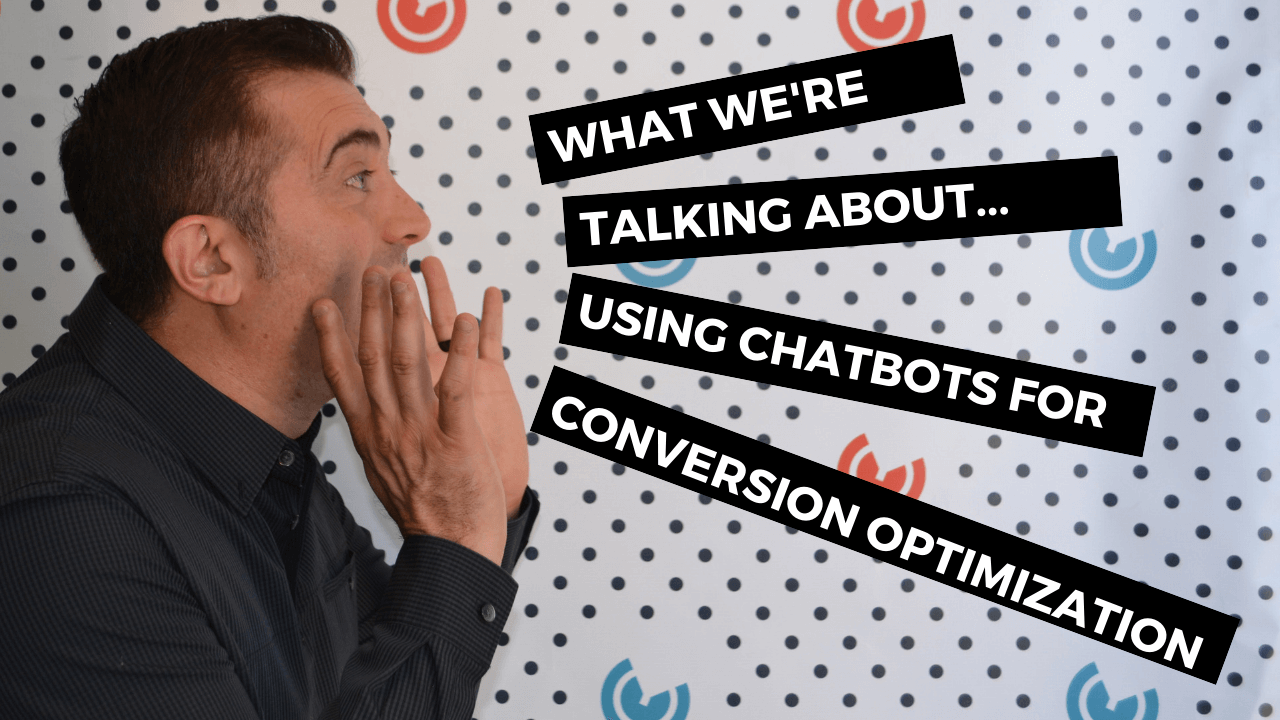1 min read
How to Use Videos on Your Website to Improve Conversion Rates
Does Video Really Improve Conversion Rates? Quite a few marketers rant and rave about the importance of video in a modern day marketing strategy--...
I know what I am looking for, and would like to chat.
A team of data-driven marketers obsessed with generating revenue for our clients.
Because the proof is in the pudding.
At Campaign Creators we live by three principles: Autonomy, Mastery, Purpose.
5 min read
 Campaign Creators
:
10/9/18 7:54 AM
Campaign Creators
:
10/9/18 7:54 AM

Customers love quality service. In certain businesses, such as retail or food service, it is often their highest priority. However, in digital businesses, because they don't often don't deal in face-to-face interactions, providing a quality customer experience can be easily forgotten. This, in turn, negatively effects customer conversion rates.
So, how can digital businesses provide similar quality customer service as physical businesses? Well, we have a trick up our sleeve called automation, and within automation, exists chatbots. Chatbots are perfect for digital businesses, because they provide a way to service customers on a one-to-one scale, breaking the impersonal approach normally associated with digital business.
Eze Sunday Eze, from Medium, discusses the functionality of chatbots, how sophisticated they are, and how they can increase customer conversion rates.
The technology of chatbots has been something we've been hearing about for the last two years it seems, but are they living up to their hype? Well, at this current time, chatbots are seen as a double-edged sword. They can either help or hurt your business.
The positives of implementing chatbots into a business include:
The primary negative of implementing a chatbot is limited to one question: how effective is it at the job it is designed to do? If it confuses the customer more then it is failing to provide quality customer service, and could possible even lose a potential customer. However, chatbot technology has grown faster than expected and is already beginning to crush this doubt.
There is a trend that chatbots optimize conversion rates. Those at Medium seem to agree and we think so too. They do so by optimizing the customer experience of a business and shortening the time it takes to reach the end of the sales funnel.
If you're still unconvinced, check out Digiday's article about Kia Motors America implementing chatbots and seeing significant increases in their conversion rates. As the article describes, Kia was facing a problem that arose because of the immense size of the company. They had over 800 websites that customers could visit, all providing customers different answers about how they can buy a car. To solve this problem, Kia had to simplify the process of accessing information. So, as you might assume, this is when they implemented a chatbot on Facebook Messenger, called Kian.
Kian saw immediate success equal to three times the conversion rate seen on Kia's main website (21% compared to 7%). In addition, overall engagement between customers and the company increased by 5000%, with a total of 600,000 engagements overseen by the chatbot. These results also provided Kia with more comprehensive information about their customers by archiving the types of questions asked and how appropriate the chatbot's response was. Before the implementation of Kian, the company gathered information based on click-rates on pages of their website, which didn't tell them what the customer was thinking.
Even though Kia chose not to prioritize an in-house AI division, they are still seeing quite an increase in their conversion rates solely from Kian. Implementing the chatbot was simple for them and could be for you too.
If you're interested in creating a chatbot for your business, but don't know where to start, take a look at Chatbot Academy's extensive list of how-to classes and tutorials. This list covers general knowledge about chatbots, such as how to create them with code and understand their framework. The list also covers chatbots for different platforms, such as Twitter, Facebook and Slack, and describes how they can be customized to fit your business.
Also available are paid courses and tutorials, which detail even more specificities of chatbots. Whether you want a quick-and-easy how-to or a comprehensive guide, this list of courses and tutorials is great for those wanting to implement chatbots to optimize their conversion rates.
If you have moderate-to-strong customer service already, but are still looking to improve it with a new marketing strategy, then the implementation of chatbots may be right for you. However, if your company is lacking in its customer service division then, because of the high expense associated with building an AI chatbot, you should not make the technology your top priority.
AI chatbot technology takes time to develop. It's based off accumulating customer data and delivering contextually accurate and helpful responses. Just look at Apple or Amazon, who have created intuitive software with Siri and Alexa. Both took years to develop, but are ultimately well-made and provide excellent service.
Let's boil Christoper Penn's video down to two points.
If your answers to these questions are generally positive, then an AI chatbot may be right for your business!
Podcast
In this podcast episode of Rethink Marketing, Larry Kim, the CEO of Mobile Monkey, discusses with Nathan Issacs the impact of changes to Facebook's algorithm for business owners and how chatbots are emerging as a new communication tool to remedy some of the losses experienced.
Larry describes chatbots as a remedy for the recent Facebook algorithm changes. The changes in Facebook's newsfeed aim to “optimize for meaningful conversations amongst your friends, as opposed to optimizing for engagement.” It's akin to becoming more of a message board rather than a television channel.
How do chatbots remedy this?
Well, he states that chatbots provide a direct communication channel with customers and leads in a two-way experience, different than communication channels like email. In addition, chatbots offer a near-instantaneous response when answering a question over Messenger, and because they are controlled by AI, they can reach anywhere between 1 and 1,000 people, or more.
Furthermore, Larry and Nathan discuss strategies for implementing chatbots, deferring to examples as to why they are effective, such as promoting a newly released blog or podcast. However, instead of just sending it blindly via chatbot over Messenger to all of your contacts, you can promote it in a form of “interactive story,” where the chatbot notifies the contact of new content, so that they can ask questions and learn more about it.
Do make sure to check out the podcast, as it is insightful and does provide more details about chatbot strategies and chatbot learning!
Business is changing and marketing automation is becoming more important than ever before. Of course, chatbots are an integrated part of this. Although, the technology is still developing and improving, recent strides have allowed it to become much more viable as part of marketing strategies, as it is heavily focused on customer experience.
If you're brave enough, use chatbots to improve your conversion rates! But, if you're looking to improve conversion rates with a less high-tech tool, utilizing landing pages to capture leads will do the job. So, check out our 20-Point Landing Page Audit. It will help you quickly and easily identify aspects of your landing pages, which you can optimize to instantly improve conversion rates.
This blog is part of Your Definitive Guide to Conversion Rate Optimization blog series

1 min read
Does Video Really Improve Conversion Rates? Quite a few marketers rant and rave about the importance of video in a modern day marketing strategy--...

In today's digital age, attracting website visitors is just the tip of the iceberg; the real challenge lies in converting those visitors into...

Every day, more than 25,000,000 pieces of content are shared.